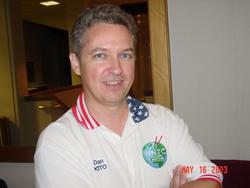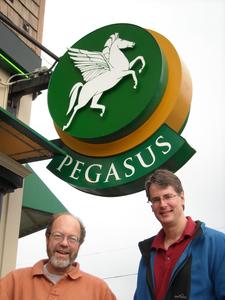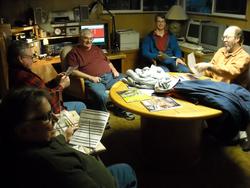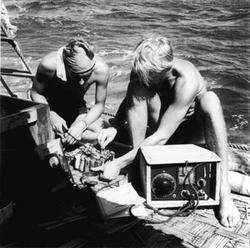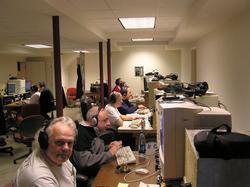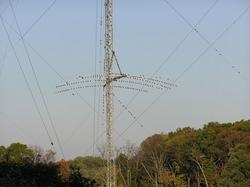 January 6, 2010 Editor: Ward Silver, NØAX | |||||||
IN THIS ISSUE
NEW HF OPERATORS - THINGS TO DO The upcoming North American QSO Parties are great contests for operators new to HF or contesting. All stations are limited to 100 watts (although you'll hear big signals from some of the larger antenna farms!) and 10 hours of operation during the contest's 12-hour period. The exchange is simple - your name and state, province, or DXCC entity. BULLETINS The QST version of Contest Corral shows the CQ WW 160 Contest starting on 30 Jan - the correct start date is 29 Jan. Don't get started late! BUSTED QSOS It may have come as news that Belden was making USB-to-serial adapters. They aren't - the manufacturer should have been Belkin. W8JK's last name was Kraus, not Krause, and to complete the trip-up triad, this is the direct link to VE7CC's "CC Cluster" software. (Thanks, Tom NØSS, Mike N6MZ, and Jim AD1C) CONTEST SUMMARY Complete information for all contests follows the Conversation section January 9-10
January 16-17
NEWS, PRESS RELEASES, AND GENERAL INTEREST
Following the untimely passing of ARRL Sweepstakes Manager, Ken Adams K5KA, there is good news to report. Dan Street K1TO has volunteered to take the reins of the oldest domestic contest. Experienced contesters know his call sign well, especially his World Radiosport Championship three-peat with teammate N5TJ and two Sweepstakes wins from the "White House" QTH of W1YL, W1CW (SK), and K4OJ (SK). Over the next few months, he'll be getting ready for the 2010 edition. Perhaps some information about Dan is in order. "The contest bug bit hard early on as a teenager and continues to afflict me today. I've enjoyed a wide variety of contesting -- domestic and foreign, CW and SSB, long and short, 160 thru 10, guest operating and at home. Contesting has been a wonderful way to meet most of my life-long friends and to see a good bit of the world. Other than the Novice Roundup, SS was my first contest back in the early 1970s and I remember it well. Operating CW at the station of my Elmer, I took an off-time to announce my best ever rate of 7 QSOs in a 10 minute stretch!" He's the current president and a founder of the Florida Contest Group, working to promote and administer the Florida QSO Party. Regarding the future of Sweepstakes, "SS has a steep tradition that has developed over its 75+ years and it must be preserved and honored. As the first Contest Manager, K5KA contributed heavily to an increased growth rate in activity and to a shortened log deadline this year that will lead to results being published more quickly. Ken's shoes are impossible to fill, but I will certainly carry the torch for those goals and to continue to preserve the integrity of the competition which seems to get tighter each year." Welcome aboard, Dan! The Yasme Foundation's Yasme Excellence Awards for 2009 have been given to the following amateurs --
On behalf of The Yasme Foundation, congratulations to the 2009 winners! (Thanks, Yasme President, Wayne Mills N7NG)
The Potomac Valley Radio Club announces another pair of its popular Webinar series: Jan 14 at 8 PM EST - K3LR on Contest University and Jan 20 at 10 PM EST - K9LA on 160 Meter Propagation. The hyperlinks will take you to the registration page for each free event. (Thanks, Ken K4ZW) The Southeastern VHF Society is calling for the submission of papers and presentations for the upcoming 14th Annual Southeastern VHF Society Conference to be held at Morehead State University in Morehead, KY on April 23rd and 24th, 2010. Papers and presentations are solicited on both the technical and operational aspects of VHF, UHF and Microwave weak signal amateur radio. Topics of interest to readers will include Station Design And Construction, Contesting, and Roving, plus many more. The submission deadline is 5 Feb 2010. (Thanks, Robin K4IDC) The annual CCF/OHDXF Contest and DX Contest will be held in Riga, Latvia this year on the 22nd-24th of January 2010. The program includes the CCF RTTY Contesting School and a focus on contesting in the Baltic countries. While you're visiting the site, read the latest edition of Pileup! Magazine. Doug, KR2Q, did some data mining in the CQ WPX survey results and the results are surprising! Would you believe your preferences might be determined by how many years of contesting experience you have? (Thanks, CQ WPX Director, Randy K5ZD) From the tunnels of a nearby data mine, the Contest Corral database for 2009, there were 328 different contests listed. Of those contests, 71% featured only HF activity, 9% only VHF+ activity, and 20% both HF and VHF+. 40% of contests allowed digital mode contacts, 56% phone, and 70% CW - not bad for a "dead" mode! Web Site of the Week - Fabian DJ1YFK is not only a hot contest operator, but a prolific programmer. Try his "Learn CW Online" program from the Web. It will teach to go a lot faster than you think you can! (Thanks, Dave NN1N) WORD TO THE WISE Ten - it's how far you should count before getting into an argument during a contest about operating techniques or frequency occupation. Life's too short and contests are even shorter! Instead of wasting calories, put them to work elsewhere on the bands to fill your log. SIGHTS AND SOUNDS
As a boy, I read and re-read the tale of "Kon-Tiki" by Thor Heyerdahl -- perhaps my first exposure to ham radio was Knut Haugland's tiny radio transmitter in one corner of the raft's hut. Later I read more about Knut's contacts as LI2B with a cinematographer in Los Angeles to help the Kon-Tiki's crew develop their film in salt water. The story of Knut's accomplishments are nicely summarized in this New York Times article following his recent death and in an ARRL Web article. (Thanks, Diane NH6HE) Here's an opportunity to listen in as an X-class (X4.0) solar flare collides with an HF contest in full swing - the 2000 CW WW Contest from P4ØE. Jose CT1BOH was recording the contest and has placed the audio online for us to listen-and-learn. Radio telescope dishes - an antenna to warm the cockles of any ham's heart! Take a tour of the world-famous Jodrell Bank facility by Adam VA7OJ in this PDF slide show. (Thanks, Tim K3LR) In case you were wondering about taking a really long trip, this cartoon about gravity wells will give you some ideas. Here's another way to get your antenna support line over a tree. Or a castle wall. Bring on the mighty trebuchet! RESULTS AND RECORDS The EU HF Championship 2009 results are now verified by the Slovenia Contest Club's Contest Committee and published on the SCC Web page. (Thanks, Robert S57AW) Thanks to the help of W3KM and his program CabEvaluator, along with ON7TK spending lots of time in writing scripts to process Cabrillo logs, and several other OM's from Belgium, the results of the 2009 UBA DX Contest are now online for both ON and DX stations. Downloadable certificates are next! (Thanks, UBA HF Contest Manager, Marc ON7SS - OO9O) Results for the 2009 Ukrainian DX Contest are now online, as well. (Thanks, Leonid UT7CL) The results for the October 2009 W / VE Islands QSO Party are posted online. NM5RC/p won the Island Rover category with five islands activated in New Mexico -- and you thought NM was mostly a desert! (Thanks, John WA4JA) OPERATING TIP Expect the unexpected - Following the Contest Update's 23 Dec issue, additional suggestions for the good propagation on the ARRL 10 Meter contest's second day came from Jon NØJK (primarily sporadic-E) and Paul K7CW (meteor scatter during the Geminids shower). There's a lot of interesting propagation on 10 meters, even at the solar minimum. Keep your eyes and ears open on the bands as there are a lot of propagation opportunities missed by the solar propagation prediction software! TECHNICAL TOPICS AND INFORMATION
Larry W8VVG noticed loud clicks on the on the first "dit" of a transmission and discovered a TR relay going bad on the amp. After replacing the TR relay he discovered the transceiver was generating RF before the relay had completely switching, causing "hot switching" and damaging the relay contacts. This can cause the first dit to be distorted or missing. Increasing the "key closure to RF" delay in the radio avoids this problem, which plagues older amps with open-frame relays that switch slowly. Paul W9AC cautions that adjusting the delay may also require some adjustment of keying weight to restore proper element duration. Use an oscilloscope to get a clear view of the output waveform - a truncated or distorted first dit should be obvious. "A CW Keying Interface" authored by W6OWP in QST, April 1987, Page 51, is highly recommended by Charlie, NØTT, as well. Getting rid of key-clicks has been suggested as an excellent New Year's Resolution. The new issue of WorldRadio Online is out - check pages 22-24 for Carl K9LA's excellent monthly propagation feature. The title this month is "Is There a Most Advantageous Band and Time?" That's a question most of us can identify with. (Thanks, Jim K9YC) Be wary of the service ratings for surplus high-voltage capacitors. Those marked "K-film" are usually intended for defibrillator or pulse-discharge applications and may not be suitable for use as filter capacitors in HV power supplies. Significant de-rating of 50% or more is required for reliable performance. (Thanks, Karl SMØAOM and Carl KM1H) Pete N4ZR writes on the subject of USB-to-serial adapters, "Whether a given USB-to-serial adapter will "work" seems to be a fairly complex issue, with the operating system, the specific application, and the specific software all being significant variables. One aspect of it has been reported to be a bug in the Visual BASIC compiler, which seems to be widely used in the building of ham radio applications. The problem is complex enough that we've concluded that the best approach is to include in our new N1MM Logger wiki manual a table of adapters that have been reported to work for specific applications under N1MM Logger." Maxwell's equations lie at the foundation of radio and are widely referenced - but what do they mean? Unless you've taken a course in Electromagnetics, their interpretation may not have been conveyed. After seeing a review, I decided to order a copy of "A Student's Guide to Maxwell's Equations" by Daniel Fleisch. This slim paperback steps the reader through the equations, to the extent of pointing out each aspect of every symbol in the equation, and relates them to their physical meaning. The book does assume some experience with calculus, but was very readable and organized in easy-to-digest sections. I am glad I took the time to read it and had several questions answered. At about the same time, a good biography of the multi-talented Maxwell appeared in the August 2009 issue of IEEE Antennas and Propagation Magazine - "Who Was James Clerk Maxwell and What Was and Is His Electromagnetic Theory?" by Sakar, Salazar-Palma, and Sengupta. There is far more to the man than his most famous equations! Thomas AC7A recommends the circuit simulator program TINA-TI as easy to learn and intuitive. The Quick-start guide will get you up to speed and you can give the demo version a try.
Why do solder joints exposed to the weather eventually fall apart? Dave AB7E has the answer -- "The lead in lead-tin solder will react with moisture to form a white crumbly oxide. Exposed to the elements, the entire joint will eventually become porous and brittle. That's why plumbing solder is lead-free, and that is what I use (otherwise unprotected) for all my outdoor solder connections." If you have noise problems at your location - and who doesn't - Pete W2PM recommends the Zelscope software. You can download a 30-day free demo and the full license only costs $10.00. The program's Oscilloscope and Spectrum Analyzer functions allow you to capture waveforms and save to files. Pete simultaneously records .WAV files of the noise to go along with the waveform snapshots, and you can Zelscope to watch the sound files in playback. When wiring up a variable autotransformer be careful not to connect the 120 VAC input voltage between the wiper and one end of the winding. The voltage out will vary, but as you rotate the shaft the input voltage appears across fewer and fewer turns until smoke is released. Repair is reported to be possible by replacing the burnt winding if you are careful. (Thanks, Gerald K5GW) Everybody has heard of a burnisher for cleaning relay contacts, but they aren't to be found at the local home-improvement emporium. Dave K6XYZ has located them at McMaster. This might be a good item to have in the toolbox. Spoof data sheets are a staple of the semiconductor industry and the Write-Only Memory (WOM) was one of the best. Technical Web Site of the Week - Dave Kirkby published a link to a Web site with plenty of tube info. It might be just the thing for that hollow-state building or repair project. CONVERSATION Creative Compendium #1 I thought I might get some interesting submissions and the Contest Update readership did not disappoint, even when bound by a draconian and arbitrary editor-imposed 128-word limit. Perhaps we'll do this again, some time. For now, enjoy the works of your peers and Happy New Year! 73, Ward NØAX ***************** Barry Shackleford W6YE contributed a code conundrum to this creative compendium - "The name of what food has the most consecutive dits in Continental Morse code?" Look for the answer in the next issue! ***************** "Blue Minimum" Right hand taps a keyer paddle, Half a world from there to here, The bands alive but five years past, ***************** "CQ Test" (To the tune of "Jingle Bells") CQ Test CQ Test Doh.... CQ Test CQ Test Dash and dits I throw Hoping they'll be heard Doh.... CQ Test CQ Test K! ***************** "A Contester's Lament" By Mark ZL3AB Deep in the south and far, far away CONTESTS 6 February to 19 February An expanded, downloadable version of QST's Contest Corral in PDF format is available. Check the sponsor's Web site for information on operating time restrictions and other instructions. HF CONTESTS 070 PSKFest--Digital, from Jan 9, 0000Z to Jan 9, 2400Z. Bands (MHz): 3.5-28. Exchange: Call sign, RST, S/P/C . Logs due: Feb 9. Rules Hunting Lions In the Air--Phone,CW,Digital, from Jan 9, 0000Z to Jan 10, 2359Z. Bands (MHz): 1.8-28. Exchange: RS(T), serial or name, club name, district. Logs due: Feb 28. Rules MI QRP Club Jan QRP Contest--CW, from Jan 9, 1200Z to Jan 10, 2359Z. Bands (MHz): 1.8-28, 50. Exchange: RST, S/P/C, MI QRP number or power. Logs due: Feb 11. Rules Midwinter Contest--Phone,CW, from Jan 9, 1400Z to Jan 9, 1800Z and Jan 10, 1400Z to Jan 10, 1800Z. Bands (MHz): 3.5-28. Exchange: RS(T) and serial. Logs due: Feb 15. Rules North American QSO Party--CW, from Jan 9, 1800Z to Jan 10, 0600Z. Bands (MHz): 1.8-28. Exchange: Name and S/P/C. Logs due: 14 days. Rules DARC 10 Meter Contest--Phone,CW, from Jan 10, 0900Z to Jan 10, 1059Z. Bands (MHz): 28. Exchange: RS(T), serial, DOK code. Logs due: 3 weeks. Rules LZ Open Contest--CW, from Jan 16, 0000Z to Jan 16, 0600Z. Bands (MHz): 3.5, 7. Exchange: 6-digit serial and serial from previous QSO. Logs due: 30 days. Rules UK DX RTTY Contest--Digital, from Jan 16, 1200Z to Jan 17, 1200Z. Bands (MHz): 3.5-28. Exchange: RST and serial. Logs due: 30 days. Rules HA DX Contest--Phone,CW, from Jan 16, 1200Z to Jan 17, 1200Z. Bands (MHz): 1.8-28. Exchange: RS(T) and serial. Logs due: 30 days. Rules North American QSO Party--Phone, from Jan 16, 1800Z to Jan 17, 0600Z. Bands (MHz): 1.8-28. Exchange: Name and S/P/C. Logs due: 14 days. Rules Feld-Hell Simpson's Sprint--Digital, from Jan 16, 1600Z to Jan 16, 1800Z. Bands (MHz): 1.8-28. Frequencies: Monthly on 3rd Saturday. Exchange: RST, QTH, Feld-Hell number. Rules International United Teenager Contest--Phone,CW, from Jan 17, 0900Z to Jan 17, 1500Z. Bands (MHz): 3.5-28, 144/432/1.2G. Exchange: RS(T) and age or "RT". Logs due: 30 days. Rules VHF+ CONTESTS MI QRP Club Jan QRP Contest--CW, from Jan 9, 1200Z to Jan 10, 2359Z. Bands (MHz): 1.8-28, 50. Exchange: RST, S/P/C, MI QRP number or power. Logs due: Feb 11. Rules LOG DUE DATES 6 February to 19 February January 7 - ARS Spartan Sprint, email logs to: spartansprint@yahoo.com, paper logs to: (none). Rules January 8 - AGB-Party Contest, email logs to: eu1eu@mail.ru, paper logs to: Igor "Harry" Getmann, EU1EU, P.O.Box 143, Minsk 220005, BELARUS. Rules January 11 - RSGB 80m Club Championship, CW, upload log at: http://www.rsgbcc.org/cgi-bin/hfenter.pl, paper logs to: (none). Rules January 12 - ARRL 10-Meter Contest, email logs to: 10meter@arrl.org, paper logs to: 10 Meter Contest, ARRL, 225 Main St., Newington, CT 06111, USA. Rules January 12 - CQC Great Colorado Snowshoe Run, email logs to: ki0rb@arrl.net, paper logs to: (none). Rules January 12 - DARC Christmas Contest, email logs to: xmas@dxhf.darc.de, paper logs to: (none). Rules January 15 - CQ Worldwide DX Contest, CW, email logs to: cw@cqww.com, paper logs to: CQWW CW, CQ Magazine, 25 Newbridge Road, Hicksville, NY 11801, USA. Rules January 15 - NA High Speed Meteor Scatter Winter Rally, email logs to: wa5ufh@ykc.com, paper logs to: (none). Rules January 15 - OK DX RTTY Contest, email logs to: okrtty@crk.cz, paper logs to: Czech Radio Club, OK DX RTTY Contest, P.O.Box 69, 113 27 Praha 1, Czech Republic. Rules January 18 - AGCW VHF/UHF Contest, email logs to: vhf-uhf@agcw.de, paper logs to: Manfred Busch, DK7ZH, Ebachstr. 13, D-35716 Dietzhoelztal-Mandeln, Germany. Rules January 19 - Croatian CW Contest, email logs to: 9acw@9acw.org, paper logs to: Hrvatski RadioAmaterski Savez, for Croatian CW Contest, Dalmatinska 12, 10000 Zagreb, Croatia. Rules January 19 - Russian 160-Meter Contest, email logs to: contest@radio.ru, paper logs to: Radio Magazine, 10 Seliverstov per., 107045 Moscow, Russia. Rules ACKNOWLEDGEMENTS ARRL Contest Update wishes to acknowledge information from WA7BNM's Contest Calendar and SM3CER's Contest Calendar. | |||||||
